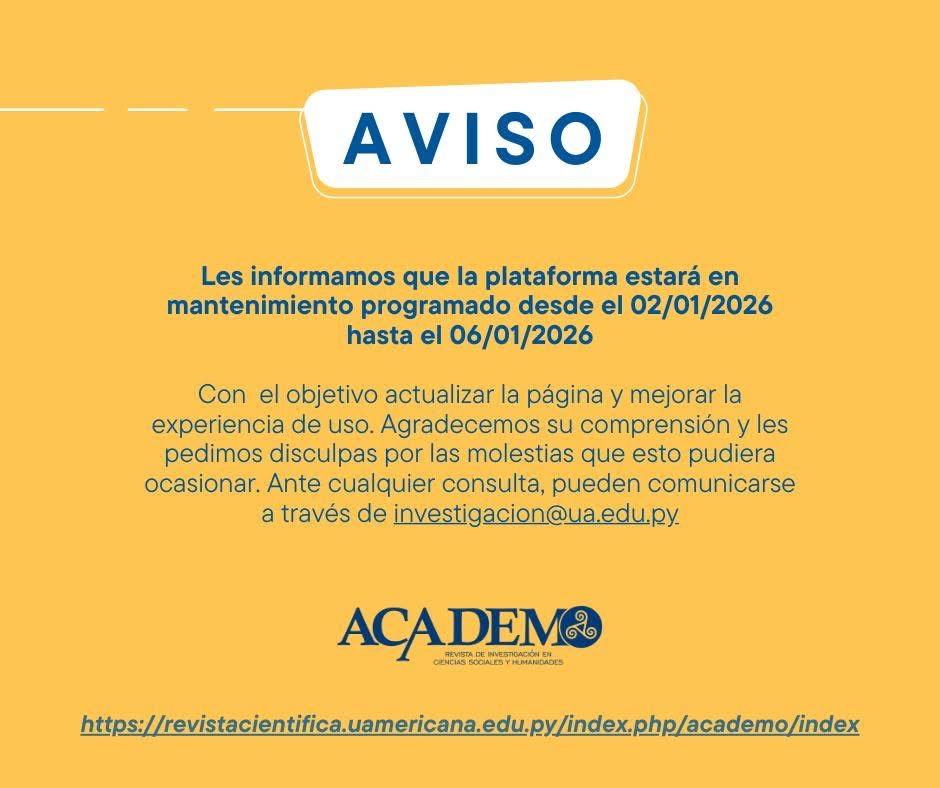Perception of the performance of magistrates in the judicial processes of Caaguazú
DOI:
https://doi.org/10.30545/juridica.2025.ene-jun.5Keywords:
Bangalore principles, perception, civil, commercial, and labor processesAbstract
This research aimed to analyze perceptions on the part of the users of the System regarding the performance of magistrates in the processing of civil, commercial, and labor cases in the city of Caaguazú in 2024, according to the principles of independence, impartiality, and integrity as outlined in the Bangalore Principles. The methodology employed in the study, which had a mixed approach, was descriptive, non-experimental, and cross-sectional. Regarding the population, the study focused on lawyers, litigants, judges, and prosecutors in the city of Caaguazú. The sampling type was probabilistic. Data collection instruments included questionnaires for interviews and surveys; the latter utilized an electronic questionnaire via Google Forms. The results indicated that respondents reported that the aforementioned principles are seriously affected and compromised by various factors, including political, economic, social, and interpersonal pressures. It is concluded that the application of the Bangalore Principles has been undermined, and therefore, it requires a serious, timely, and effective response from the Court to investigate the situation and, if necessary, rectify it to restore the rule of law.
Downloads
References
Felices Mendoza, M. E. (2020). Alcances del principio de la diligencia judicial. Ius Inkarri, 9(9), 373-401. https://doi.org/
31381/iusinkarri.v9n9.3692
La Tribuna. (2023, 16 de Junio). La mora es un problema del sistema judicial que nunca se acaba. Diario La Tribuna. https://www.latribuna.com.py/destacado/23267-la-mora-es-un-problema-del-sistema-judicial-que-nunca-se-acaba
Llobet Rodríguez, J. (s.f.). Ética Judicial. https://pjenlinea3.poder-judicial.go.cr/biblioteca/uploads/Archivos/Articulo/ETICA%20JUDICIAL%20LLOBET.pdf
Mejía Mori, B. (2001). Corrupción Judicial en Perú: Causas, formas y alternativas. Derecho & Sociedad, (17), 208–215. https://revistas.pucp.edu.pe/
index.php/derechoysociedad/article/view/16871
Mellinghoff, R. (s.f.) El Grupo de integridad judicial y los Principios de Bangalore sobre la conducta judicial. Programa estado de derecho Latinoamérica. https://www.kas.de/documents/271408/16552318/El+Grupo+de+
Integridad+Judicial+y+los+Principios+de+Bangalore+sobre+la+conducta+judicial
+%28Alem%C3%A1n%29.pdf/3589cd90-bc6e-d79a-32ba-de3e67e4e872?ver
sion=1.0&t=1676932706811
Observatorio del Estado de Derecho. (2024). Estado de derecho en Paraguay. https://observaestadodederecho.desarrollo.edu.py/estado-de-derecho/
Palacios Fantilli, J. M. (12 de abril de 2018). El Expediente Electrónico: justicia online. https://espanha.columbia.edu.py/presencial/derecho/noticias/937-el-expediente-electronico-justica-online-por-juan-martin-palacios-fantilli
Rojas Betancourth, D. (2017). El ideal ético del juez: dos preguntas sobre comporta
miento y percepción. Anuario de Derecho Constitucional Latinoamericano, 23, 625-632. https://revistas-colaboracion.juridicas.unam.mx/index.php/anuario-derecho-constitucional/article/view/33929/30883








